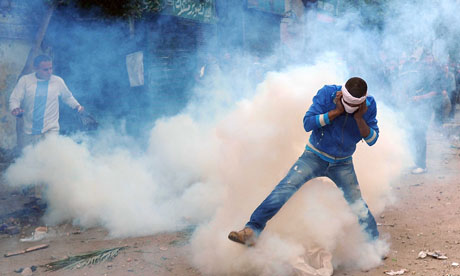
@epaulnetPaul Erickson
The Guardian: #Libya, #Egypt and #Syria all face an uncertain #futureguardian.co.uk/world/2011/nov… #Assad #CivilWar #Mideast Don't we all.

A protester attempts to stamp out teargas during clashes with security forces in Cairo on Sunday. Photograph: Mohamed Omar/EPA
Seasonal images for the Arab uprisings – spring giving way to summer, autumn and now winter – have a hit or miss quality. But the dramatic events in three countries over one weekend all point to variable weather and uncertain outcomes.
Egypt has been the most important chapter from the start because of its sheer size and influence, so state repression and anger at the generals who have ruled since Hosni Mubarak's overthrow are deeply worrying for those still nurturing the hopes born in Tahrir Square in January.
The prospects for the parliamentary elections, which are due to start next week, are unclear, although critics argue that they will be meaningless unless the military sets a date for handing over power to civilians. Field Marshal Mohammed Hussein Tantawi, hailed for persuading Mubarak to go, is under mounting pressure to step down himself.
Old habits die hard: instead of repealing Egypt's hated emergency law, the generals have extended it, while protecting their own privileges. Increasingly, analysts warn, it looks like a stark choice between the army and the Muslim Brotherhood, still the only really organised political force.
In the face of their own gloomy prospects, Egyptians can only envy the smooth running of Tunisia's elections last month, where the success of the Islamist party Nahda underlined the difference between polls rigged by autocrats and free ballots in a multi-party democracy.
If Arab and international attention is focusing again on Egypt, events inSyria have taken on a riveting dynamic of their own. A rocket attack on an office of the ruling Ba'ath party in Damascus was further evidence of the growing capability of armed rebels to challenge President Bashar al-Assad.
In the course of last week, a well-planned assault on a security facility outside the capital, Syria's suspension from the Arab League and a call by King Abdullah of Jordan for Assad to quit, all added to the sense of a regime under relentless pressure. In the coming days, Arab economic sanctions look likely to be added to those imposed by the US and EU.
Assad looks and sounds out of touch: in one weekend interview – a self-serving exception to the ban on foreign journalists – he claimed that only 600 people have been killed in unrest since March; the UN says it is at least 3,500 and rising. Elections would be held next year, he pledged – probably far too late.
Preoccupied as he must be, Syria's president cannot have missed the capture of Muammar Gaddafi's son Saif al-Islam and the brouhaha about whether he will be tried in Tripoli or at the International Criminal Court in The Hague. But legal questions apart, Saif al-Islam's re-appearance will be a sobering reminder of the altogether more brutal end met by his father in Sirte last month – a fate that could await Assad and his family if there is not a swift political turn to the Syrian crisis.
The chances of that happening look slim: elements of the Syrian opposition still favour dialogue with the regime, but that is not the view of the Syrian National Council, a coalition of groups and individuals that is starting to win international legitimacy, or of the band of armed and emboldened deserters who constitute the Free Syrian Army.
For jubilant Libyans, the capture of Saif means closure: after 42 years the Gaddafi dynasty no longer has any prospect of making a comeback. Huge problems remain: the formation of an interim government, the imposition of national authority over the rebel brigades, the management of expectations for a brighter future. The difficulties should not be underestimated. But Libya has broken with its past.
Three countries are still writing their own chapters of the Arab uprisings, watching each other as the world watches them. No one can yet predict how or when the whole story will end.
